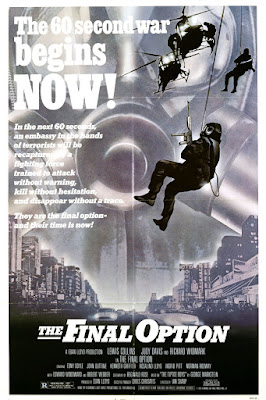Right-wing propaganda masquerading as shoot-’em-up entertainment, this thriller was known as WHO DARES WINS upon its original British release, but was retitled THE FINAL OPTION for MGM’s U.S. release. It was not a hit in American theaters, but it played on HBO seemingly 70,000 times, despite its R rating, so somebody must have been watching it. It’s too long (125 minutes) and the political story is not terribly interesting, but when director Ian Sharp, who later directed second unit on GOLDENEYE, gets the opportunity to stage violent action, THE FINAL OPTION is impressive. If only there was more of it.
Based loosely on the Special Air Service’s 1980 raid on London’s Iran embassy, which had been hijacked by Arab terrorists, THE FINAL OPTION stars Judy Davis (A PASSAGE TO INDIA) as the leader of “The People’s Lobby,” a terrorist organization that takes over the home of the American ambassador to England (Don Fellows), who is hosting a dinner for Secretary of State Richard Widmark (COMA) and Army general Robert Webber (S.O.B.). All she wants is for the U.S. to blow up one of its Navy bases in Scotland. Fat chance, sister, with the SAS on the case!
The SAS’ secret weapon, luckily for them, is already in the house. Top-billed Lewis Collins (TV’s THE PROFESSIONALS) botched his undercover assignment to infiltrate the People’s Lobby, but Davis takes him along on the hostage-taking anyway, probably because he turns her on in the sack (anything for England, dear boy). Edward Woodward (THE WICKER MAN) is properly staunch as the SAS man who sends Collins on the mission, and horror fans may recognize Ingrid Pitt (THE VAMPIRE LOVERS) as one of the terrorists (British television star John Duttine is another).
Collins was almost in OCTOPUSSY, but judging from his work in THE FINAL OPTION — his first lead in a feature — he would have been a Lazenbyesque James Bond. He’s okay in the fight scenes, but has little chemistry with Davis or the actress playing his wife and is generally lacking in color and charisma. That’s a problem with a thriller with so little action (Davis’ group doesn’t invade Fellows’ home until the third act) and so much dialogue. His mainstream film career never took off, nor did that of director Sharp, who went back to television.
Saturday, June 19, 2021
Subscribe to:
Posts (Atom)
